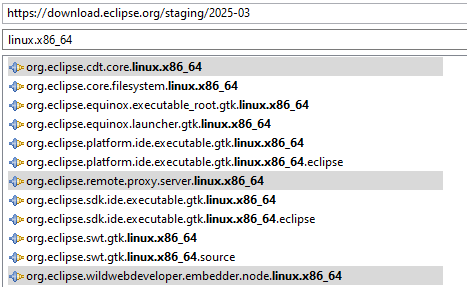[
Date Prev][
Date Next][
Thread Prev][
Thread Next][
Date Index][
Thread Index]
[
List Home]
|
Re: [cross-project-issues-dev] Tycho target environments
|
As I understand it, each of those combinations is relevant if
Maven/Tycho needs to run on that environment, if you need to
produce fragments/products for that environment, or if you need to
compose such fragments into your update site, i.e., each is
relevant if that combination is actually used/needed.
One way to look at it is to ask, what happens if the fragment/IU
for any particular combination is missing? E.g., locally on
Windows your build will need the win32 fragments of SWT even just
to compile anything that depends on SWT. But on Windows, if the
mac or linux fragments are missing, most likely nothing will care,
unless of course you also are trying to include all these
fragments in your update site or trying to build products for
multiple platforms and want to include a product for that
combination.
This is why the Platform can add things like linux riscv64 or
ppc64le without anyone else necessarily taking action. EPP for
example now provides a linux package for riscv64 but not for
ppc64le.
https://github.com/eclipse-packaging/packages/blob/a1bdda42da3bd7c4d781adf225cb8bc46f6b3c66/releng/org.eclipse.epp.config/parent/pom.xml#L130-L172
So it all boils down to which fragments you need to consume
and/or produce as well as which fragments you need in order to run
on the build
on host machine; ci instances are generally linux/gtk/x86_64 by
default, so you can't leave that out. There really aren't many
fragment producers on the train.

Keep in mind too that EMF is consumed by the Platform and still
the Platform is able to provide support for os/ws/arch
combinations so no wrist slapping was or is required (and that
pure Java can run anywhere that a JVM with the required EE and
packages exists).
On 28.12.2024 07:36, Edward Willink via
cross-project-issues-dev wrote:
Hi
While revising pom.xml's for Java 21, I noticed the following
possibly stale target-platform-configuration section
<environments>
<!--environment>
<os>win32</os>
<ws>win32</ws>
<arch>x86</arch>
</environment-->
<environment>
<os>win32</os>
<ws>win32</ws>
<arch>x86_64</arch>
</environment>
<!--environment>
<os>linux</os>
<ws>gtk</ws>
<arch>x86</arch>
</environment-->
<environment>
<os>linux</os>
<ws>gtk</ws>
<arch>x86_64</arch>
</environment>
<environment>
<os>macosx</os>
<ws>cocoa</ws>
<arch>x86_64</arch>
</environment>
</environments>
The commenting was necessitated by the removal of 32 bit
support.
However IIRC we now have ARM support and https://download.eclipse.org/eclipse/downloads/drops4/R-4.34-202411201800/
identifies macosx.cocoa.aarch64 but no linux equivalent.
The table in https://eclipse.dev/eclipse/development/plans/eclipse_project_plan_4_34.xml#target_environments
is not clear to me, but seems to suggest aarch64 for Ubuntu Long
Term Support. (It would help if there was a mapping to the Tycho
target-platform-configuration spellings.)
Looking for an exemplary project to copy, I find that EMF has
just the same three x86_64 environments.
Are these environment settings irrelevant, or are EMF and my
projects and no doubt many others needlessly excluding their
usage with some supported Eclipse environments?
If so, perhaps the SimRel aggregator needs to start slapping
wrists.
Regards
Ed Willink
_______________________________________________
cross-project-issues-dev mailing list
cross-project-issues-dev@xxxxxxxxxxx
To unsubscribe from this list, visit https://www.eclipse.org/mailman/listinfo/cross-project-issues-dev

